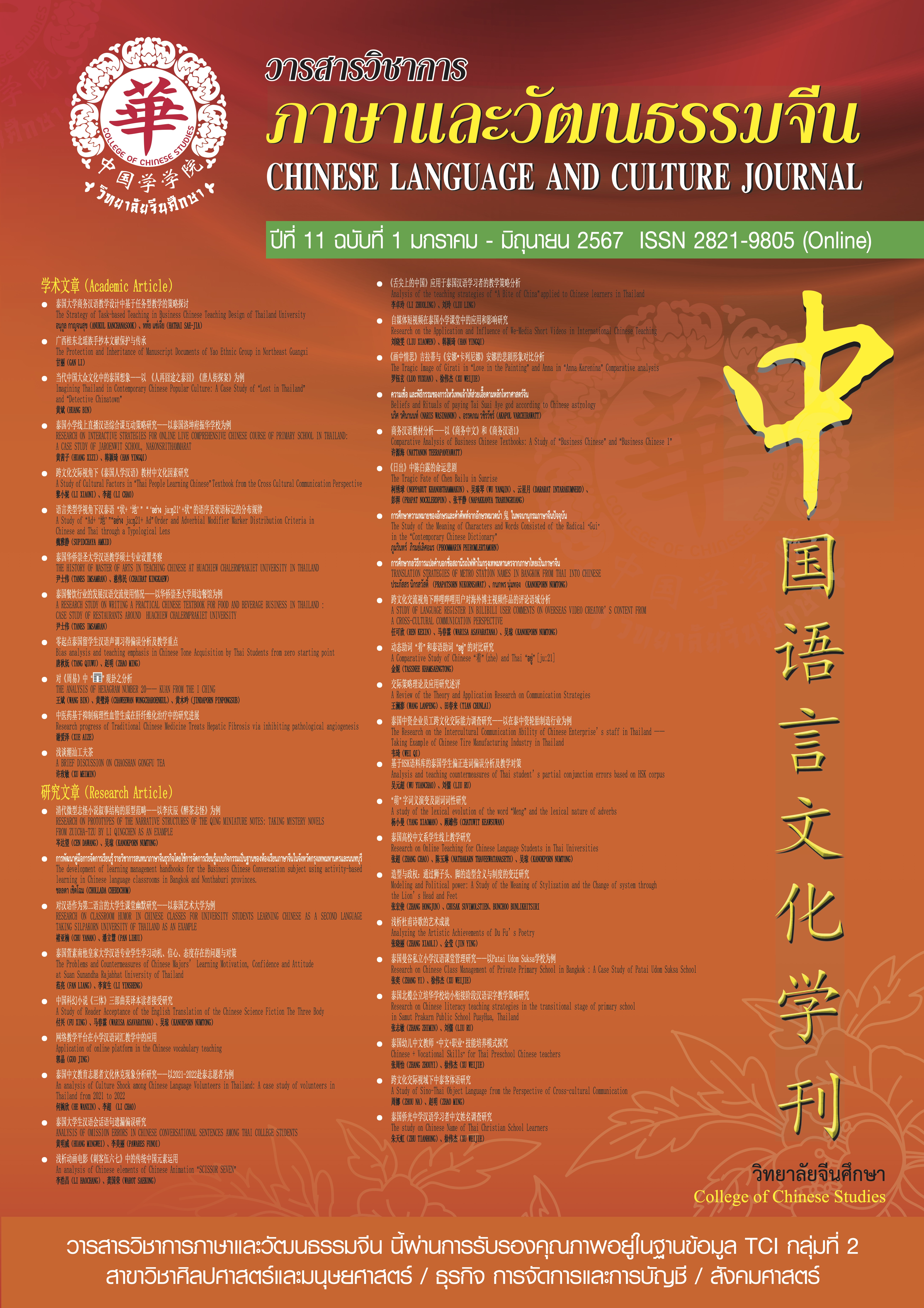泰国高校中文系学生线上教学研究
คำสำคัญ:
泰国高校中文系学生, 在线教学平台, 满意度, 持续使用意愿บทคัดย่อ
本研究以泰国高校中文系学生为研究对象,通过对230名具备丰富在线教学平台使用经验的学生进行问卷调查,并运用多元线性回归分析方法,深入探讨了影响学生对在线教学平台满意度及其持续使用意愿的关键因素。研究者首先细致描绘了受访学生的性别、学校类型、地域分布和年级结构等人口统计特征。其次对满意度影响因素进行分析,发现感知趣味性和期望确认度对满意度的影响显著且正面,标准化系数分别为0.2121和0.6304,显示在线教学平台若能提供有趣的内容和满足学生的期望,将极大提升学生对平台的满意度。此外,研究者还通过多元线性回归模型考察了感知有用性、感知易用性、感知趣味性、感知互动性、期望确认度以及满意度这六个变量对持续使用意愿的影响。结果显示,满意度在决定学生是否愿意持续使用在线教学平台中起到关键作用,其决定系数达到0.888,表明该因素可以解释近9成的变异影响。
这项研究为泰国高校中文系学生在线学习行为及其影响因素提供了实证依据,建议中文教学平台要注重感知趣味性以及学生期望确认度的达成,这样才能提高学生的使用满意度和持续使用的意愿。
เอกสารอ้างอิง
Hair Jr, J. F., Sarstedt, M., Hopkins, L., & Kuppelwieser, V. G. (2014). Partial least squares structural equation modeling (PLS-SEM): An emerging tool in business research[J]. European business review, 26(2), 106-121.
Kotler, P. (1997) Marketing: An introduction (2nd ed.)[M]. USA, Prentice: McGraw-Hill Companies.
LUO, Q., & WATTANAKAMOLKUL, P. (2022). 泰国中文专业大学生线上汉语学习满意度及影响因素研究: Research on the online Chinese learning satisfaction and influencing factors of Chinese major in Thai University[J]. Chinese Language and Culture Journal, 9(1), 125-142.
Ringle, C.(2014) Bido, D., & da Silva, D., . Structural Equation Modeling with the Smartpls[J]. Brazilian Journal Of Marketing, 13(2).
Salkind, N.J., (2015) Statistics for those who hate statistics[M]. A. Çuhadaroğlu (Trans. Edt.). Ankara: Anı Publishing
付卫东, 陈安妮, 周威, 谭杰文. (2020). 疫情期间中小学教师在线教学的现状, 满意度及持续使用意愿调查研究——以湖北省咸安和崇阳试验区为例[J]. 现代教育技术.
苏恒瑞. (2021). 疫情之下在线教学平台持续使用意愿研究——基于用户价值理论[J]. 湖北广播电视大学学报.
孙爱晶,范九伦,张二锋. (2023). 教育数字化背景下高校教师在线教学持续使用意愿的实证研究———以 S 省为例[J]. 高教学刊, 27, 97-100.
覃红霞, 方芳, 周建华. (2022). 大学生在线教学满意度和持续使用意愿的性别差异研究[J]. 大学教育科学.
覃红霞, 李政, 周建华. (2020). 不同学科在线教学满意度及持续使用意愿——基于技术接受模型 (TAM) 的实证分析[J]. 教育研究, 41(11), 91-103.
覃红霞, 周建华, 李政. (2021). 高校师生在线教学持续使用意愿的差异研究[J]. Journal of Higher Education, 42(1).
万力勇, 代晓慧, 杨琼娇, 姚芳茜, 王金萍. (2023). 是什么阻碍了小学教师对在线教学的持续使用?———基于 34 位小学教师访谈文本的质性分析[J]. Teacher Education Research, 35(1).
王红艳, 孙宏恩, 雷维娜, 首新, 胡卫平. (2021). 后疫情时代高校教师在线教学接受行为研究——有调节的中介模型[J]. 教师教育学报, 8(1), 92-100.
熊强, 李文元, 陈晓燕, 李治文. (2022). 在线教学平台交互性, 体验价值和持续使用意愿的关系研究——一个有调节的中介效应[J]. 管理评论, 34(6), 153.
张红霞. (2021). 高校学生用户对在线教学平台的持续使用意愿研究[J]. 中国教育信息化.
周建华, 陈凤菊, 李政. (2024). 从工具理性走向价值理性:我国大学生在线教学持续使用意愿的影响因素[J]. 开放教育研究, 30(1), 99-110.
ดาวน์โหลด
เผยแพร่แล้ว
รูปแบบการอ้างอิง
ฉบับ
ประเภทบทความ
สัญญาอนุญาต
ลิขสิทธิ์ (c) 2024 วารสารวิชาการภาษาและวัฒนธรรมจีน

อนุญาตภายใต้เงื่อนไข Creative Commons Attribution-NonCommercial-NoDerivatives 4.0 International License.
บทความที่ได้รับการตีพิมพ์เป็นลิขสิทธิ์ของวารสารภาษาและวัฒนธรรมจีน มหาวิทยาลัยหัวเฉียวเฉลิมพระเกียรติ
บทความใน “วารสารวิชาการภาษาและวัฒนธรรมจีน” เป็นทรรศนะของผู้เขียนโดยเฉพาะ กองบรรณาธิการไม่มีส่วนในความคิดเห็นในข้อเขียนเหล่านั้น




